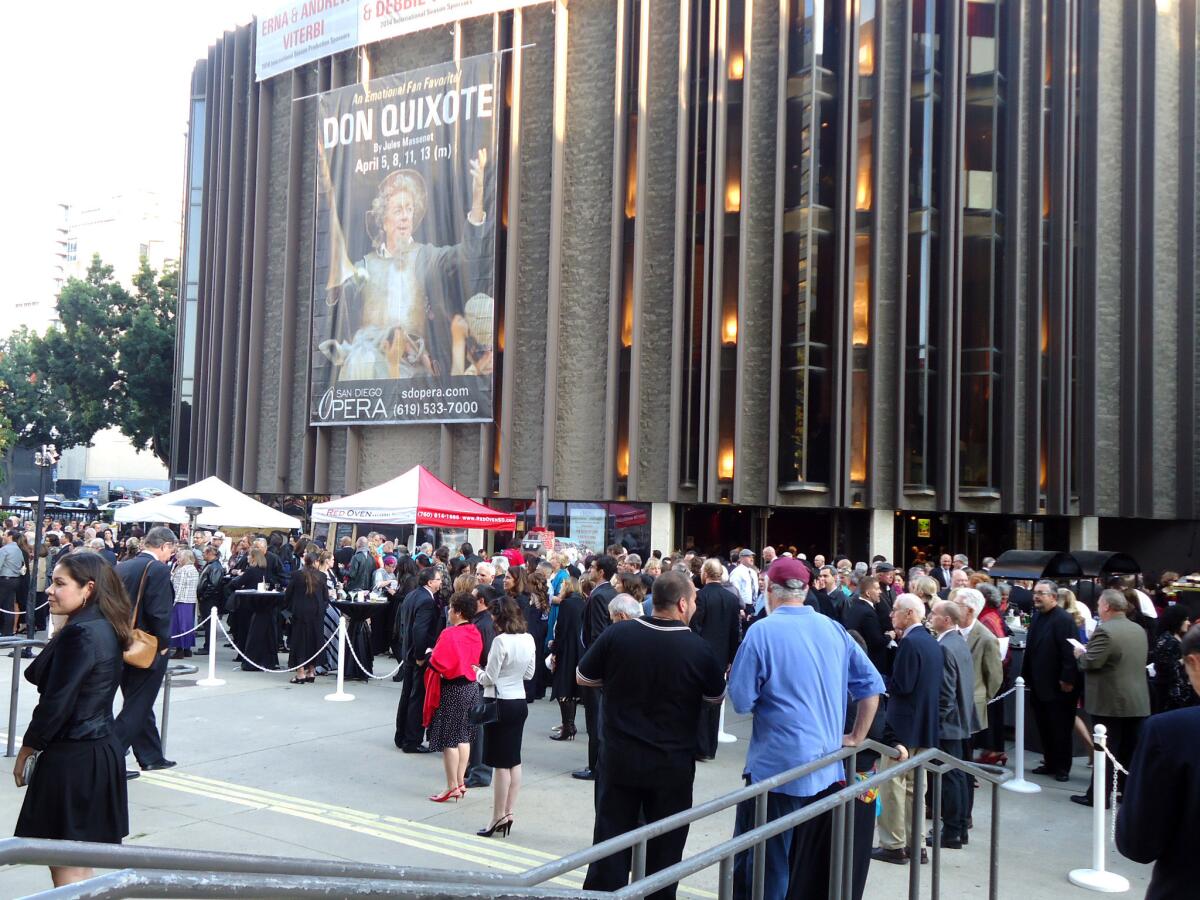Newly reborn San Diego Opera now facing state audit

Having announced this week that it had reversed its decision to close its doors, the newly reborn San Diego Opera faces another challenge on its road to recovery: an investigation by the California attorney general.
The opera said it had received a letter from the office of Atty. Gen. Kamala Harris requesting it turn over certain records and retain all existing documents.
A spokesman for the opera said he could not elaborate on the nature of the request. Bruce Ross, an attorney who represents San Diego Opera, said the attorney general’s letter was sent to the opera’s former president, Karen Cohn, who resigned last month at a contentious board meeting.
“Presumably, this notice was generated before there was a change in leadership [at the opera],” said Ross.
The company is cooperating fully with the audit, Ross added.
The opera has received some funding from the cities of San Diego and Chula Vista, as well as from San Diego County. It has also relied on private donations and ticket sales to fund its operations.
In a prepared statement, Keith Fisher, the opera’s chief operating officer, said the company welcomed “the opportunity to open our records to Kamala Harris’ office, as doing so will assure the public of our promise of transparency and good governance.”
A spokesman for the attorney general said the office doesn’t comment on possible investigations.
Lorena Gonzalez, a state assemblywoman for District 80 in San Diego, said she’d reached out to the attorney general in mid-April with concerns about the way opera leaders handled the announcement that the opera would close.
She said there were questions about Ian Campbell, the opera’s longtime general and artistic director, and whether he and other leaders had given an accurate portrait of the company’s financial health when communicating with potential donors and government funding sources.
“There are questions about whether the company received taxpayer dollars based on false information,” said Gonzalez.
However, a lawyer for Campbell disputed Gonzalez’s concerns. “Ian was fairly consistent in representing accurate information to donors and especially internally within the company,” said Gil Cabrera, a San Diego attorney. Campbell himself was not available for comment.
In an email to The Times last month, Dana Springs, the interim executive director of San Diego Commission for Arts and Culture, which issues millions of dollars in annual grants to nonprofit arts groups, said “there was nothing in the San Diego Opera’s applications for city funding that caused the ... application review panelists to question the financial viability of the organization.”
She added that the opera had “successfully met the requirements” of all its past grant agreements.
Before its initial March announcement that it was folding, San Diego Opera had applied for a city grant for its 2014-15 fiscal year starting in July. In the two previous years, it had gotten the highest possible score from the grant reviewing panel, and was awarded $368,199 for its 2013 season and $389,157 for the 2014 season that ended in April.
Under the city’s arts grant system, San Diego Opera’s track record, including high scores on its grant applications and lack of turnover in its top management, had qualified it in recent years to use a “short form” that allowed it to skirt a direct question about whether it was facing “significant issues, concerns or challenges” that might affect its future.
Earlier this month, San Diego Opera officially severed ties with Campbell, who had led the company since 1983. Campbell and his ex-wife, Ann Spira Campbell, who was deputy general director, have been the subject of much public scrutiny in recent weeks.
Ian Campbell was a key proponent of the March decision to close the opera. The announcement took people inside the company by surprise, with many saying that company leaders had not previously alerted them to any financial problems.
Cabrera, Campbell’s attorney, said information about the company’s financial state was publicly available. He added that Campbell and other leaders had concerns about whether they could pull off a 2015 season and that they wanted to act fiscally responsibly.
Campbell’s annual salary at the opera often exceeded $500,000, and some have questioned whether that amount was appropriate for a nonprofit organization facing financial difficulties.
The company announced Monday that its board had formally rescinded the decision to shut down and that the new season would launch in January with three main-stage productions, rather than the usual four. The new leaders at the opera have been raising money for the season.
The company has forecast a budget of approximately $10.5 million for the new season. It said it has raised about $4.5 million toward its $6.5-million goal.
The attorney general’s investigation will likely put a cloud of uncertainty over the opera, said Donald Kramer, an attorney in Philadelphia who specializes in nonprofit law. “This now becomes a public relations issue for the current board as to whether it can get the support it is seeking,” he said.
Depending on how the opera handles the attorney general’s requests, the audit could give opera leaders a chance to clear the company’s name, said Carol Weisman, a nonprofit management consultant.
“If they handle it well, it’s a great opportunity. If they handle it badly, they’re dead in the water.”
More to Read
The biggest entertainment stories
Get our big stories about Hollywood, film, television, music, arts, culture and more right in your inbox as soon as they publish.
You may occasionally receive promotional content from the Los Angeles Times.












